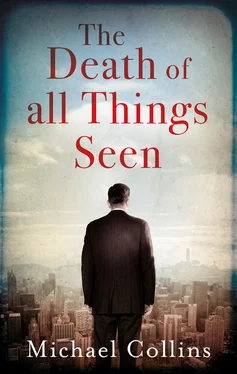There were memories laid down, a series of acts that defined her presence, back at the apartment, her panties stained with a rusty blood, the discoloration of the water in the bathroom sink, the intimacies of the body’s workings. There were nylons, too, wrung and hung casually over the shower railing.
He liked all this. He would not have anticipated it, but, when it was presented, he thought, here was a life, and he was a part of it. He sensed her creating it for him in the simple act of making lunch, and that a life was not any one thing, but a series of concatenated actions that created a greater context when viewed in their totality.
Norman poured a cheap, screw-top wine into a tumbler. They were in for the afternoon, locked in shadows. In a small library on the second floor, Norman held the weight of books stamped and worn, a hardback cloth threadbare and shiny with the oil of thumbprints — a library containing Joseph Conrad’s Heart of Darkness , Hemingway’s The Old Man and the Sea , and Jules Verne’s Twenty Thousand Leagues Under the Sea .
He looked through a porthole window, saw a small church and, beyond, a hole in the ground where men had descended daily. In observing it, he understood better what an education must have offered in the past for those who could make a living above ground, what a powerful inducement it must have been to study here, and to witness Hell, to see a hole consume and disgorge human life and to know there was an alternative in books, to study and hear the concussive explosive blasts deep underground, the horror and ever-present danger always there and that took so many.
In the associated history of the area, there had been worker unrest and strikes. Norman paged through a book with accompanying black-and-white photographs of miners in an age when people made a living here on coal.
He went out eventually into the pouring rain in search of a statue and found it by an abandoned spine of rail track — a bronze statue of a miner wearing a hard hat with a miner’s lamp, a pick in his hand. Veins showed in a defining grip and strength that was little needed anymore, though, in standing alongside it, it put into perspective the life Norman’s father had inhabited, the reach of Mayor Daley and the Machine, and how protective a class of men had to be to ensure dignity and a living wage.
He checked the toll of death in the mine and the surrounding mines at a small museum dedicated to miners above a post office. The deaths were all accounted for in handwritten ledgers. The museum had been underwritten by Loretta Lynn, the famed Coal Miner’s Daughter, a woman of great beauty and voice, who, for a time had brought the plight of the miners into the American consciousness — what they had offered the nation, and, in return, how they had been treated, the insidious slow death of black lung and the sudden cave-ins — solidarity, the only foothold the working class had against management.
Norman felt it, a gathering sense of what was then needed, and needed again, the rallying defiance of a generation, of a class consciousness that had been eclipsed somewhere during the Reagan Presidency.
He found a computer with an Internet connection back at the small schoolhouse library, and, searching archives, he found footage of the old Mayor Daley of his father’s vintage, Daley, glad-handing, tipping his hat along a St Pat’s Day parade route, in a coronation of the ordinary, a river run green with Irish pride and the color of money.
A voiceover echoed Daley’s 1968 post-Democratic Convention statement, ‘Gentleman, get the thing straight once and for all — the policeman isn’t there to create disorder, the policeman is there to preserve disorder,’ a gaff glossed over by a reporter who, in the spirit of the times, declared, ‘We reported what he meant, not what he said.’
There was accommodation of interests and sympathies then, words not parsed and put under scrutiny, when it was so damn hard to get said right, what needed to be said, when, for most of your life, you spoke around a feeling and never fully understood it.
For Norman Price, it accounted for honesty, when contradictions, missteps, were an essential divining rod of how life was lived, and that there was nothing inconsistent in holding any number of contrary opinions on any number of subjects. It was the human condition.
Norman looked up into the glare of light. He had witnessed it even in the new politics of a supposedly unfettered history that came after the corruption of Daley, how Obama, a would-be presidential hopeful a year earlier, had mysteriously not recollected his former church pastor’s alleged statements against white injustice and American Imperialism, suggesting either that Obama was a liar, or that there were Truths one told among one’s own kind, or to oneself, that fed only a part of the font of who one was, and that a person could hold two histories simultaneously, two contradictory histories, and still somehow be true to oneself.
At times, survival necessitated looking beyond apparent incongruities.
For a moment, Norman thought again of Mr Ahmet, a great friend to his father — Mr Ahmet who, as a lawyer, had spent the greater part of his career defending the indefensible because it needed defending, so careers in such circumstances often ended with inevitable regrets, in willful compromises where a different set of laws and underlying truths superseded what might be arbitrated and made sense of in a court. What Mr Ahmet had hated — he, of all people, a lawyer — was factuality, too much evidence and not enough understanding.
It was deeply appreciated. Mr Ahmet’s humanity evidenced in the comportment of how he carried out his duties. It was a way of negotiating life that Norman had never fully understood in his aloneness. This was how cities had once survived. Chicago, to be sure, this city that had sanctioned only so many histories, so there could be only one St Patrick’s Day, so that Mr Ahmet and Joanne’s Armenian boyfriend’s father, with his little known nation’s genocide, were left bereft, their histories held sacred in small Orthodox communities and yet somehow, their histories had survived among their kind.
They were gone the following morning, time collapsing in the run of mile markers and state borders crossed, the subtle and almost unnoticeable change until it was upon them. The retreat out of the Blue Ridge Mountains, the sharp flint brilliance of an azure tropical light replacing the dappled interlace of a forest canopy with its slow dialed movement of bluebells and ephemerals, small faced flowers tracking the sun like a congregation of faithful in the slats of a radiant, life-giving light.
There was so much to be observed and praised.
*
Captain Cody’s outside Daytona had an All-U-Can-Eat seafood salad bar buffet done as a sandbar on an isthmus of castaway islands set against a wallpaper background of the bluest sky imaginable. A low level hush of breaking sea surf underscored the tranquility of this island paradise made real, the floor sprinkled with sand, the buffet done up like a shanty beach shack draped in fish netting and garlands of seaweed and fake starfish.
Norman was in the process of sprinkling a benediction of crumbling crackers over a bowl of hot chowder. They were in a clam-shaped booth.
Grace sat wearing a pirate’s patch over one eye, just like Captain Cody. The waitress called her ‘a pearl’, not once or twice, but every time she refilled Grace’s Pepsi. Grace was so taken with the name that she called herself Pearl.
The name Grace belonged to an affectation bestowed by Kenneth. She materialized in this new name, with an orientalism and beauty that eclipsed the Christian idea of Grace. The name, bestowed on her so casually, augured a cosmological order. This child would become his daughter in the best way he could accommodate and be her father. He would try his very best.
Читать дальше












